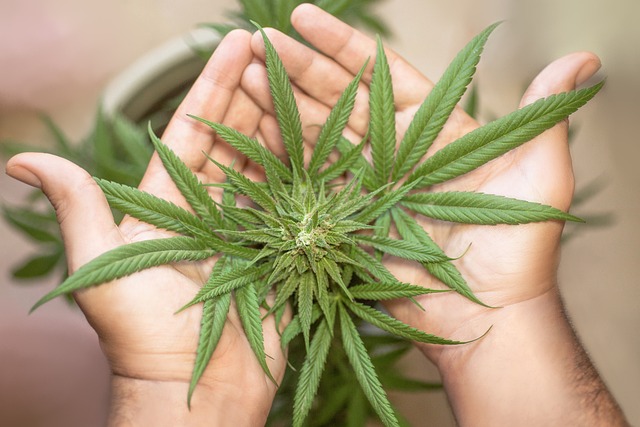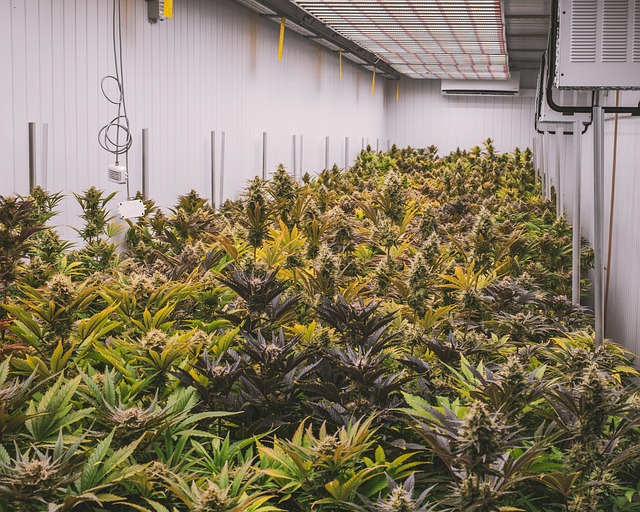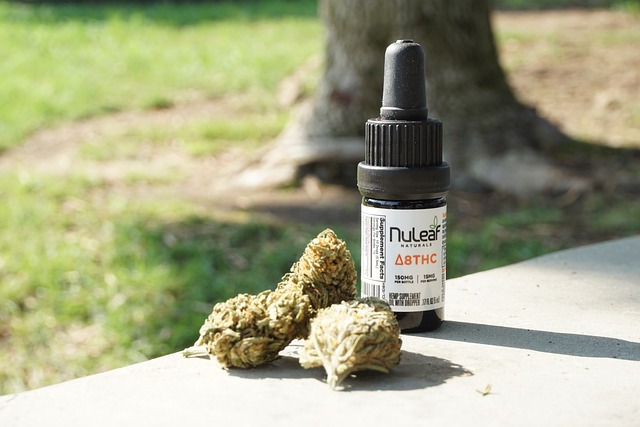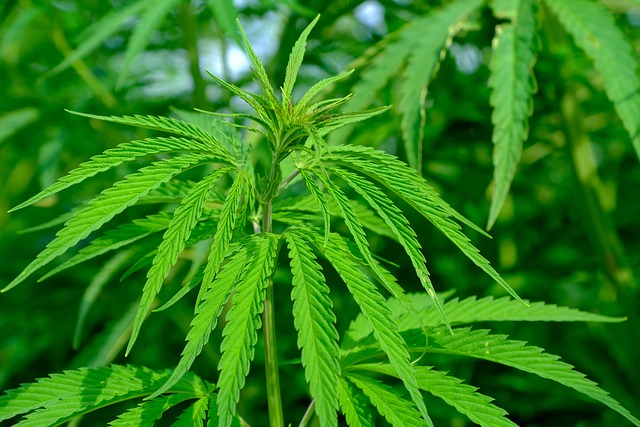In New Mexico, THCA (Tetrahydrocannabinolic Acid), a non-psychoactive cannabinoid found naturally in raw cannabis plants, has become a focus of attention due to its potential health benefits and distinct legal status. With the Cannabis Regulation Act of 2021, adults can legally possess up to two ounces of cannabis or edibles with a THC content of 0.3% or less, making THCA flower, which contains this level or less of THC, fully compliant within the state. The state's progressive legislation has facilitated research and utilization of THCA, which is available without a medical card and is gaining popularity for its therapeutic properties, including anti-inflammatory and pain-relieving effects, without psychoactive side effects. Consumers are advised to purchase from credible sources that offer lab testing to ensure legal compliance. As a wellness component within New Mexico's legal market, THCA is being explored for its potential benefits, supported by ongoing research. It's important for consumers to understand the Entourage Effect and how the combination of cannabinoids in THCA flower can influence their experience, as they consider this option alongside traditional medical cannabis products under the Lynn and Erin Compassionate Use Act.
explore the nuanced effects of THCA flower, a non-psychoactive cannabinoid gaining attention among New Mexico’s residents for its therapeutic potential. As this emerging cannabinoid carves out its niche in legal markets, it’s crucial to understand its characteristics, side effects, and how it aligns with local laws. This comprehensive guide delves into the science behind THCA, its legality within New Mexico, and practical advice for consumers seeking quality products. Whether you’re new to cannabinoids or an experienced user, this article aims to provide a clear, evidence-based overview of THCA flower and its impact on well-being.
- THCA Flower: A Comprehensive Overview for New Mexico Residents
- The Emergence of THCA in Legal Markets: A New Mexico Perspective
- What is THCA and How Does it Differ from Other Cannabinoids?
- Potential Side Effects of THCA Flower: An Honest Assessment
- Understanding the Legality of THCA in New Mexico: A Guide for Consumers
- The Entourage Effect and THCA Flower: Implications for Users in New Mexico
THCA Flower: A Comprehensive Overview for New Mexico Residents

THCA, or Tetrahydrocannabinolic Acid, is a non-psychoactive cannabinoid found in raw cannabis plants, which, when heated, converts to the well-known psychoactive compound THC. For residents of New Mexico, understanding the legal status and effects of THCA flower is crucial due to the state’s progressive stance on cannabis legislation. As per New Mexico’s Cannabis Regulation Act, which became effective in June 2021, possessing up to two ounces of cannabis or cannabis-infused edibles is legal for adults over 21 without the need for a medical card. THCA flower, being a form of raw cannabis, falls within this legal framework when it contains less than 0.3% THC by weight.
New Mexico residents interested in the therapeutic properties of cannabis may find THCA flower particularly appealing due to its potential health benefits, which include anti-inflammatory and pain-relieving effects without the high typically associated with THC. It’s important for consumers to source their THCA flower from reputable dispensaries or cultivators that provide accurate lab testing to ensure they are within the legal THC limits. As with any new supplement, individuals should start with a low dose and consult with a healthcare provider if they have existing health conditions or are taking other medications. The emerging market for cannabis products in New Mexico offers a diverse range of options for residents, with THCA flower being one of the latest additions to explore for its potential wellness benefits.
The Emergence of THCA in Legal Markets: A New Mexico Perspective

The emergence of THCA, or tetrahydrocannabinolic acid, a non-psychoactive cannabinoid found in raw cannabis plants, has become a topic of significant interest within legal markets. In New Mexico, this natural compound has garnered attention due to its potential therapeutic properties and the state’s progressive stance on cannabis legislation. As laws have evolved, allowing for broader uses of cannabis derivatives, THCA has come to the forefront, offering a legal avenue for those seeking the benefits associated with cannabis without the psychoactive effects typically found in its more processed forms like THC. New Mexico’s approach to legalizing medical and adult-use cannabis has created a fertile ground for the exploration and utilization of THCA, reflecting a commitment to innovative wellness solutions within the legal market. Local producers and consumers alike are delving into the potential of THCA flower, which is gaining recognition not only for its non-intoxicating properties but also for its unique effects that may complement a wide range of health and wellness regimens. This burgeoning interest in THCA underscores the dynamic nature of cannabis science and the evolving landscape of legal markets in states like New Mexico, where legislative changes are opening up new possibilities for consumers and researchers alike.
What is THCA and How Does it Differ from Other Cannabinoids?

Tetrahydrocannabinolic acid (THCA) is one of the primary cannabinoids found in the Cannabis sativa plant, which also includes CBD (cannabidiol) and CBN (cannabinol). While CBD is known for its therapeutic properties without intoxicating effects, and CBN is the degraded form of THC, THCA exists in raw cannabis plants and remains non-psychoactive. The legal status of THCA-rich products varies across jurisdictions within the United States. In New Mexico, for instance, the state’s legislature has made strides in legalizing medical marijuana that contains higher levels of THC, including THCA. This legislative action reflects the growing body of research on cannabinoids and their potential health benefits.
THCA differs from other cannabinoids like THC (tetrahydrocannabinol) primarily in its chemical structure and psychoactive effects. When heated or combusted, THCA converts into THC, which is the compound most associated with the ‘high’ experienced by cannabis users. THCA, on the other hand, has been studied for its potential anti-inflammatory, anti-nausea, anti-anxiety, and neuroprotective properties. These effects are thought to be due to THCA’s ability to interact with the body’s endocannabinoid system, influencing various physiological processes without producing psychoactive effects. The interest in THCA, particularly in states like New Mexico where its legal status is more favorable, is driven by both the medical community and consumers seeking alternatives to traditional pharmaceuticals for managing pain, inflammation, and other conditions.
Potential Side Effects of THCA Flower: An Honest Assessment

THCA, or Tetrahydrocannabinolic Acid, is a non-psychoactive cannabinoid found in the Cannabis sativa plant that has garnered attention for its potential wellness benefits. As THCA remains non-psychoactive until it is decarboxylated through heating, such as when smoking or vaporizing cannabis flower, understanding its effects and side effects is crucial for consumers, especially in regions like New Mexico where THCA-rich hemp products are legal.
While THCA is generally considered safe and may offer therapeutic benefits without the psychoactive “high” associated with THC, it’s important to be aware of potential side effects. Users have reported mild adverse reactions, which can include dizziness, dry mouth, and altered mood. These side effects are typically mild and temporary, but individuals with certain health conditions or those who are sensitive to cannabinoids should approach THCA-rich products with caution. It’s also worth mentioning that the effects of THCA can vary depending on dosage, individual physiology, and the specific strain of the hemp flower being used. As New Mexico navigates the evolving landscape of hemp legislation, consumers are encouraged to educate themselves on responsible use and to consult with healthcare professionals before incorporating THCA products into their wellness routine.
Understanding the Legality of THCA in New Mexico: A Guide for Consumers

In the realm of cannabis derivatives, THCA or Tetrahydrocannabinolic Acid has garnered attention for its potential therapeutic effects and distinct legal status. For consumers in New Mexico, navigating the legality of THCA can be a nuanced process due to both state and federal regulations. As per New Mexico state law, THCA is legally permissible and can be found in various cannabis products, including flowers. However, it’s crucial for consumers to understand that while THCA itself is legal, the psychoactive compound THC is also legal in New Mexico under the Lynn and Erin Compassionate Use Act. This act allows for the use of medical cannabis for qualified patients, which can include forms of cannabis that contain THCA that will later convert to THC upon heating or decarboxylation. It’s important for consumers to stay informed about local regulations as they may vary from county to county within the state. Understanding the legal distinctions between THCA and THC is key for responsible consumption and adherence to the law in New Mexico. Consumers are advised to always purchase cannabis products from licensed dispensaries and retailers to ensure compliance with state laws.
The Entourage Effect and THCA Flower: Implications for Users in New Mexico

In New Mexico, where THCA flower is legally recognized, users have access to a cannabinoid that exists in its natural, non-psychoactive form before decarboxylation, which activates its psychoactive properties as THC. The Entourage Effect, a phenomenon within the field of cannabis research, describes the synergistic interaction between different cannabinoids, terpenes, and flavonoids found in the plant. This complex interplay can influence the efficacy and experience of using cannabis products, including THCA flower. For New Mexico residents considering THCA legal in their state, it’s crucial to understand how the Entourage Effect may alter the effects of the flower. Unlike THC-dominant products, THCA is known for its potential anti-inflammatory and neuroprotective properties, making it a subject of interest for users seeking therapeutic benefits without psychoactive effects. The presence of other cannabinoids and compounds in the THCA flower can enhance or modify these effects, leading to a unique user experience that may differ from high-THC products. As such, individuals in New Mexico exploring the legal THCA market should be mindful of how the Entourage Effect can shape their experience with this cannabinoid, ensuring they select products that align with their wellness goals and preferences. Understanding the nuances of THCA flower and its interactions within the cannabis plant is essential for users looking to harness its potential benefits in a legal and informed manner.
In conclusion, the emergence of THCA flower within legal markets in New Mexico presents a new frontier for residents seeking alternative wellness solutions. As outlined throughout this article, THCA possesses distinct properties that differentiate it from other cannabinoids. While its potential side effects should be carefully considered—as thoroughly examined in “Potential Side Effects of THCA Flower: An Honest Assessment”—consumers can navigate the legal landscape with confidence, thanks to “Understanding the Legality of THCA in New Mexico: A Guide for Consumers.” The entourage effect associated with THCA flower underscores its unique benefits for users in New Mexico. It’s crucial for residents to stay informed on the evolving legal status of THCA within the state, ensuring safe and responsible use. As such, this comprehensive overview provides a clear understanding of THCA and its standing as a legal cannabinoid in New Mexico, equipping consumers with the knowledge they need to make informed decisions about their wellness journey.
